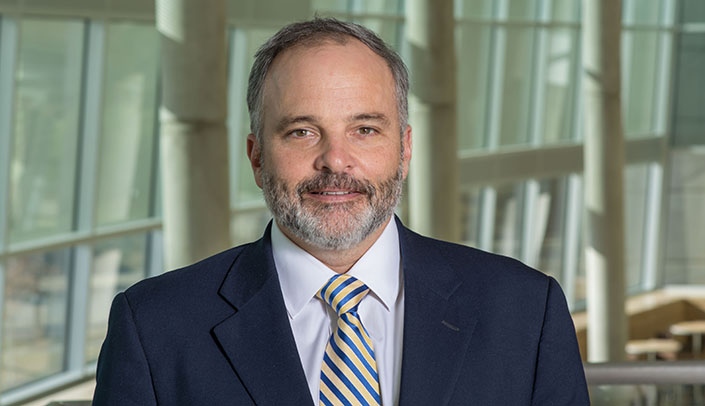UNMC leaders held a Zoom briefing on the COVID-19 pandemic for state legislators Wednesday morning, discussing both national and statewide statistics and answering questions for legislators on topics such as aerosolized spread and positivity rates.
“We are pleased that legislators continue to see UNMC as a trusted resource on developments pertaining to the pandemic,” said Bob Bartee, vice chancellor for external relations. “We see this as a valuable role for UNMC to perform during these challenging times.”
Providing the briefing were James Lawler, MD, executive director of international programs and innovation at the Global Center for Health Security; Angela Vasa, director of quarantine and isolation services; and Chris Kratochvil, MD, associate vice chancellor for clinical research.
Among the points Dr. Lawler mentioned during his presentation to the legislators were:
- Following a summer surge nationally in COVID-19 cases, we saw a decline and plateau into August, but now 11 states, including Nebraska, had seen a surge in positive tests since schools opened;
- Nebraska has done well in limiting COVID-19 deaths relative to the total number of cases in the state, but COVID-19 deaths are increasing in Nebraska compared to many other states;
- Despite earlier assumptions, children probably get COVID-19 at rates equal to or higher than adults; and
- Experts hope for a vaccine approval by the end of the year, with widespread availability possibly by late spring. It appears that most U.S. vaccines may require two doses.
Vasa outlined UNMC and Nebraska Medicine collaborations with organizations such as the Nebraska Department of Health and Human Services, Nebraska Public Health Districts, Omaha Public Schools and others.
While discussing the Med Center’s on-site consultations, Vasa said, various sites in the state had shown a willingness on the part of collaborators and partners to implement best-practice strategies, even challenging strategies, to mitigate the spread of the virus, and that there is an increased level of general awareness of the principles of infection control.
“These partnerships have flourished and given us an opportunity to effect preparedness and response efforts across the state,” she said.
She added, however, that UNMC personnel were seeing a “COVID-19 fatigue” in the community — including health care workers, the general public and industry leaders — that could lead to the growth of a lax attitude toward infection prevention and control efforts such as masking and handwashing.
“People are starting to get tired of hearing about COVID-19, and this is exactly when our public health officials and our emergency preparedness experts need to keep talking about it,” she said. “We need to remain diligent in our preparedness efforts.”
Dr. Kratochvil discussed UNMC’s coronavirus research efforts, including the UNMC-COVAXX collaboration.
“We have been one of the leading institutions in COVID-19 research, not only in partnership with the National Institutes of Allergy and Infectious Diseases in their remdesivir trials, but also in our partnership with COVAXX, test development, and evaluation of protective equipment. Once again, Nebraska is on the cutting edge in helping protect our nation,” Dr. Kratochvil said.
